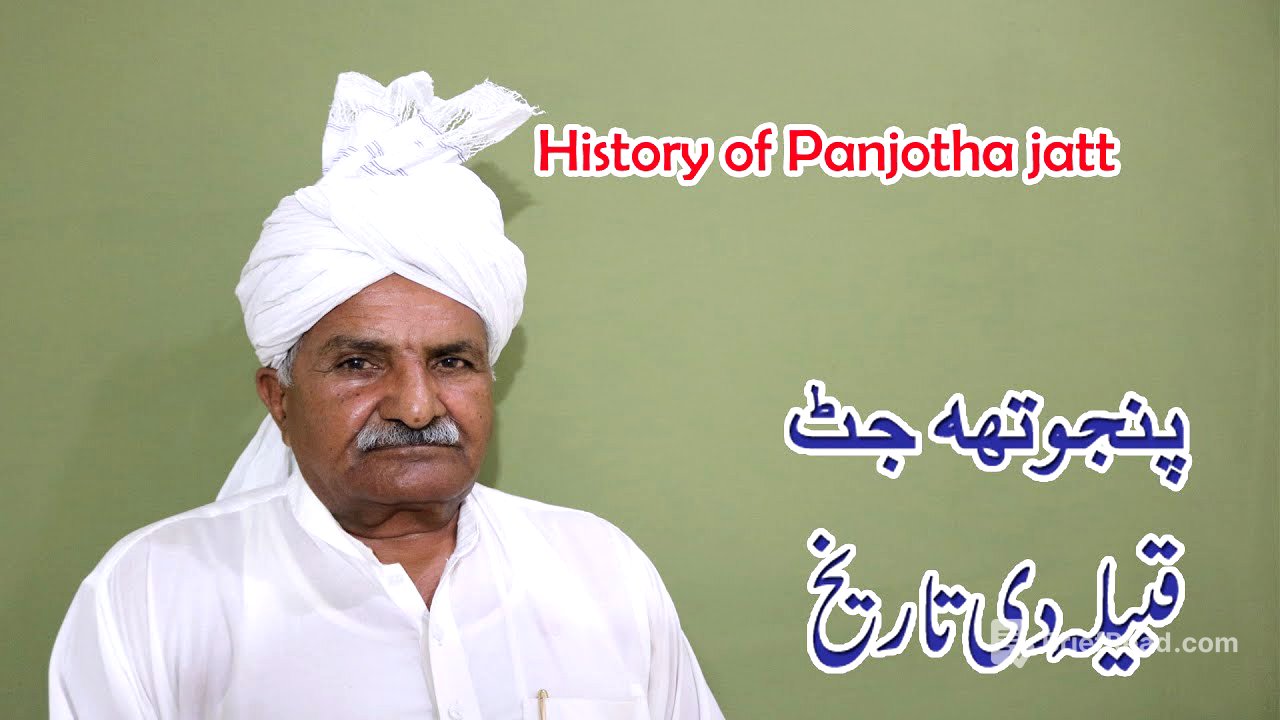TLDR;
This video discusses the Panjotha Jat tribe, tracing their lineage and historical mentions. It covers their origins from Sindh and Balochistan, references in historical texts, and a detailed Kursinama (genealogy) that connects them to figures like Hazrat Adam and Hazrat Nuh. The summary includes the tribe's spread across various regions and their connections to significant historical and mythological figures.
- The Panjotha Jats are described as Suraj Bansi Jats with a thousand-year history.
- Their lineage is traced back to figures like Hazrat Adam and Hazrat Nuh through a detailed Kursinama.
- The tribe's historical presence is noted in regions including Sindh, Balochistan, Iran, and parts of India.
Introduction to the Panjotha Jat Tribe [0:00]
The video introduces the Panjotha Jat tribe, a Suraj Bansi Jatt group with origins dating back a thousand years. The tribe's lineage starts with Panjotha, son of Pansota, grandson of Pan, and great-grandson of Panaich. These people migrated from Sindh and settled in various regions, including Sindh, Balochistan, Iran, Dera Ghazi Khan, Dera Ismail Khan, Rajputana, Jodhpur, Bikaner, Jaisalmer, and Punjab.
Historical Records of the Panjotha Jats [0:43]
The discussion references historical mentions of the Panjotha Jat tribe, citing the "Glossary of Tribes and Castes" by ED McLegan and HA Rojara, which mentions Wahiwan Jats in Shahpur under the Panjotha title. The video also mentions a Kursinama (genealogy) of the Panjotha Jatt tribe shared by Arya Dr. Lal Baksh Naich Malli Jatt from Mirpur Mathela Singh.
Kursinama: Tracing the Lineage from Hazrat Adam to Sindh [1:09]
According to the Kursi Nama, the lineage begins with Hazrat Adam, referred to as Shiv Shankar or Mahadev in Hindi, and extends to Hazrat Nuh, called the second Manu, whose grave is in Manda, Gujarat. Hazrat Nuh had two wives and seven sons, including Sam, Ham, and Yafes (also called Mahesh). The descendants of Sam settled in Asia, Ham in Africa, and Yafes between Turkey, China, and Europe. The lineage continues through Arfaka, also known as Sindh, and Ishwar (Aram), linking to Armenia and other regions.
Descendants of Arfakha Singh Sindh [2:57]
Arfakha Singh Sindh's sons included Sakhar, Bhakhar, Thattha, Hol, Harmesh, and Amar, who were associated with Alexander the Great's race. Other sons included Dagar, considered a non-Aryan race, and Jashar (also Lajar), from whom King Samud and the Jat dynasty originated. Arakh Singh Gujarat had sons Jodh, Bika, and Jaisal, who founded Jodhpur, Bikaner, and Jaisalmer. Other descendants founded cities and regions like Udapa, Taxila, Suhabi, Assam, and the Tamil nation.
Lineage Through Mula to Aad (Mohan) [3:42]
Mula's descendants include the origin of Multan (Kushebpura), Mizoram, Makran, Kerman, and Hanwadar (Gwadar). Kaan (Kalat) founded Kalat, Khujdar, and Sis. Mula's sons also include Astubar, Sarvai, and Iram. Iram's lineage continues through Uj and Sagat. Aad, also known as Mohan or Daro, Mohan Kot, and Rini Kot, is another descendant.
From Ago to Queen Balqis [4:28]
Ago's sons include Jalud and Sahraeb, from whom Nimrod became king, along with Pattan, Kahu, Jukar, Dji, Aror, Duhaga, Arorka, Taxila, Hari, Popiya, Talunja, Daga, Shadad, Shadid, Bala, Mehr (Mehrgarh fort), and Suhaga. Jalud's sons include Ba, Arnand, Challa, Amber, Brahma, Suhaga, and Modha. Ba's sons include Vishnu, Surambu, and Chetu. Simbhu and Gorakh (Hazrat Hud al-Salaam) are also mentioned, with Gorakh associated with the city of Peshawar. Ago's sons also include Jani Gorkha, Harid Dadu, Gabbar, Babbar, Tandoor, Barbara, Heem, and Bhem. Barbara's sons are Abru, Aber, and Abrin, whose descendants include Kaitan, Som, Agni, Sui, Nirsal, Sala, Bhumi, Mandir, Mahan, Sarus, Arnan, and Yakub. Kaitan's sons, Yoktan, Falaj, Salj, and Ya Rabb, settled in Yemen, and Queen Balqis was from their lineage.
Lineage to Hazrat Ibrahim and Hazrat Ismail [5:50]
Yaqtan's son, Shahrukh Mamba, had a son named Nahur (Hazrat Ayub al-Salam Awal), a king and prophet of Multan. Nahur's sons included Abel, Shabbar, Bashar, Shabir, Bashir, Kharan, Tarakh, and Azar. Tarakh's sons were Ibrahim (Hazrat Ibrahim Al-Salam), Faur, Nahur, and Haran. Faur was the father of Hakim Luqman, and Haran was the father of Hazrat Lot Al-Salam. Nahur's sons, Laban and Nethuel, had daughters who married Hazrat Jacob Al-Salam and Hazrat Isaac Al-Salam, respectively. Hazrat Ibrahim Alai Salam had four wives, who bore 13 sons and two daughters, including Hazrat Islam and Hazrat Ismail Al Salam.
Descendants of Hazrat Ismail and the Suraj Bansi Jats [7:27]
Hazrat Ismail al-Salam had sons including Naabu (Kiranvi), Misha (founder of Mecca), Kidar (ancestor of the Holy Prophet), Umail, and Pameel. They were called Roha Hira, Jatoor, Timaan, and Nafs, and had a daughter named Bisma, who married Hazrat Saal al-Salam's son, Issa, and from her, Salat, the founder of the Roman Sultans, was born. Nayabut Kiran's son was Uttar, also known as Narchi, Shamail, and Narayan. Uttar's sons included Ila, Arma, Arud, Nari, Varun, and Samdarman. Nari founded the Suraj Bansi Jats, and Parasram became the sixth incarnation of the Hindus. Samdarman's race led to the Chandrabansi Jats, including the Bhatti family.
Lineage of the Suraj Bansi Jats [8:35]
Nari's son, Suraj, had a son named Kashep, whose son was Kiran. Kashep's son was Deol, who had two sons, Mannu and Bachcha. From Mannu's lineage, the dynasty of Ram Chandra Ji was born. The first Suraj Bansi Jatt Maharaja Seh was the son of the first Sun. Bachcha's son, Kachva, became the first Suraj Bansi incarnation, followed by Budhapal, Shashpal, Hamsa Seen, Adhu Chalak, Nirmal Chalak, Nehasranas Chalak, Minder Chalak, Mas Chalak, Malku Chalak, Suraj Chalak, Leela Chalak, Amrit Chalak, Gyan Chalak, Amarmal, Gulab Chalak, Ashmat Chalak, Bura Chalak, Jabar Mal, Hamsa Raj, Bhojraj, Suraj Mukhi Raj, Kiran Raj, Chandra Singh Raj, Gawa Sangh Seen, Balda Seen, Dudeshi, Hamsa Seen, Mulraj, Chalak Raj, Sotrak Raj, Saroya Raj, Malra Mali, Naich, Panaich, Pan, Pansota, Pansera, Apna Paniira, Panchi Wala, Pan Saura, and Panjotha.
Final Descendants and Conclusion [10:33]
Panjotha's sons included Pan Chak, Panjuwal, and Panjwani. These five pao are also mentioned. A tribe in Afghanistan is said to be from Panchhera. The video concludes by stating that this was the story of the Panjotha Jat tribe.









